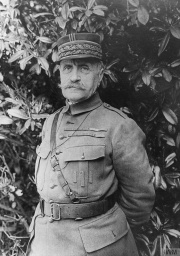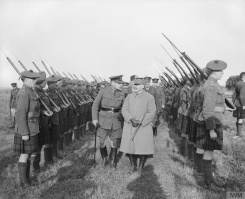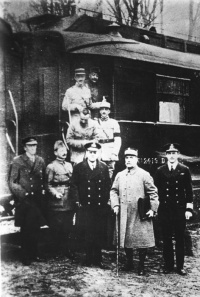Early Career↑
The sixth child of a middle-class, Catholic family, Ferdinand Foch (1851-1929) studied in Paris at the prestigious Ecole Polytechnique, and then in 1872 joined the French Army’s "intellectual" arm, the artillery. In 1895 he attended the Ecole Supérieure de Guerre (ESG), the French staff college. After graduation and a series of brief appointments with field units and with the ministry in Paris, Foch became an instructor at the ESG in 1895. Promoted to lieutenant-colonel in 1898, colonel in 1903 and brigadier-general in 1907, he was appointed commandant of the ESG (1908–1911). During his time as commandant, he gained useful contacts with his British counterpart, General Henry Wilson (1864-1922), and with the Russian military.
First World War Career↑
On the outbreak of war in August 1914, Foch commanded the élite XX Corps covering the mobilisation of France’s Second Army in eastern France along the frontier with Germany. Although his corps was forced to retreat after the Morhange battle in Lorraine during the disastrous Battle of the Frontiers, the French commander-in-chief General Joseph Joffre (1852-1931) recognised Foch’s energy and drive. Joffre appointed him to command the new Ninth Army, which played a pivotal role during the Battle of the Marne in September 1914. Next, he gave Foch the task of coordinating the forces in northern France as they tried to envelop the invading enemy armies. During the First Battle of Ypres in October–November 1914, despite lacking any formal authority, Foch’s spirited coordination of the Belgian, British and French forces ensured his acceptance as Allied generalissimo in the crisis of March 1918.
Foch spent 1915 and 1916 in unsuccessful attacks against the German lines in northern France, and was sacked in December 1916 following the disappointments of the Battle of the Somme. His energy and experience were clearly indispensable, however, for in May 1917 he returned as chief of the army general staff in the French war ministry. He spent much of his time at international conferences, coping with the manifold difficulties created by the Russian defection, the arrival of American troops in France, and the Italian disaster at Caporetto in October 1917.
When the first German spring offensive in March 1918 threatened to split the British and French armies, Foch was the logical choice to coordinate the Allied armies and to take over strategic direction of the war on the Western Front as supreme Allied commander. As four more German offensives smashed into the Allied lines, all Foch could do was exhort and refuse to relieve front-line troops unless absolutely necessary. Finally, in July 1918, Foch seized the opportunity to counter-attack and set in motion a rolling series of Allied offensives aimed at freeing the vital railway lines serving Paris and Amiens in northern France. In recognition of his service, Foch was elevated to the dignity of maréchal de France on 6 August 1918. Finally, his sequenced and converging attacks drove the Germans back until they were forced to request an armistice. The German delegation signed Foch’s terms on 11 November 1918.
Post-war↑
During the treaty negotiations, Foch insisted that the Rhine should mark Germany’s western frontier, but he failed to convince the Allies. In 1929 Foch died in Paris, and was given an impressive funeral service in Notre Dame cathedral. He is interred in the Invalides.
Elizabeth Greenhalgh, University of New South Wales
Section Editor: Alexandre Lafon
Selected Bibliography
- Autin, Jean: Foch, ou, Le triomphe de la volonté, Paris 1987: Librairie académique Perrin.
- Greenhalgh, Elizabeth: Foch in command. The forging of a First World War general, Cambridge; New York 2011: Cambridge University Press.
- Neiberg, Michael: Foch. Supreme Allied Commander in the Great War, Washington, D.C. 2003: Brassey's.
- Notin, Jean-Christophe: Foch, Paris 2008: Perrin.
- Philpott, William: Marshal Ferdinand Foch and Allied victory, in: Hughes, Matthew / Seligmann, Matthew S. (eds.): Leadership in conflict, 1914-1918, Barnsley 2000: Leo Cooper, pp. 38–53.











